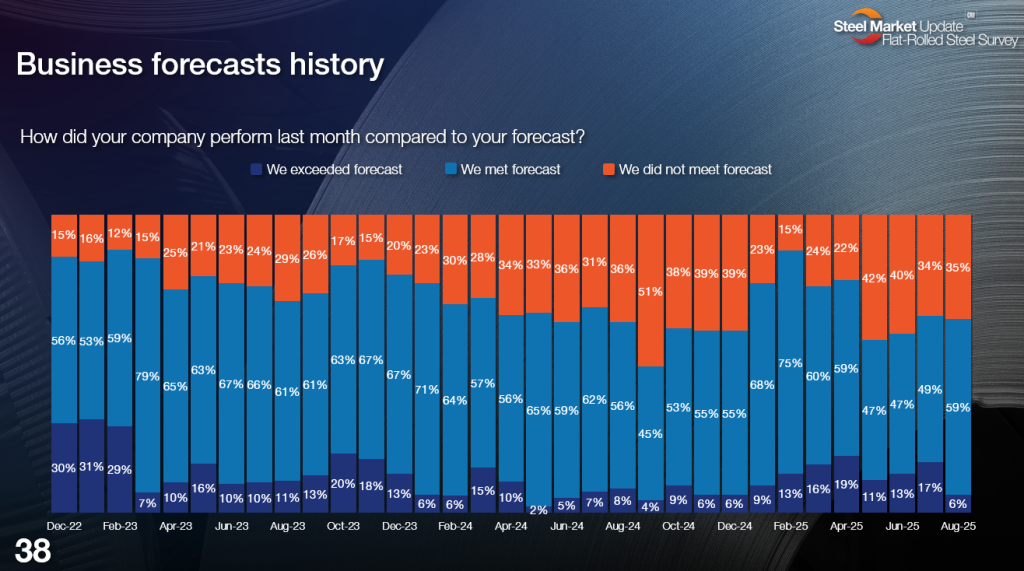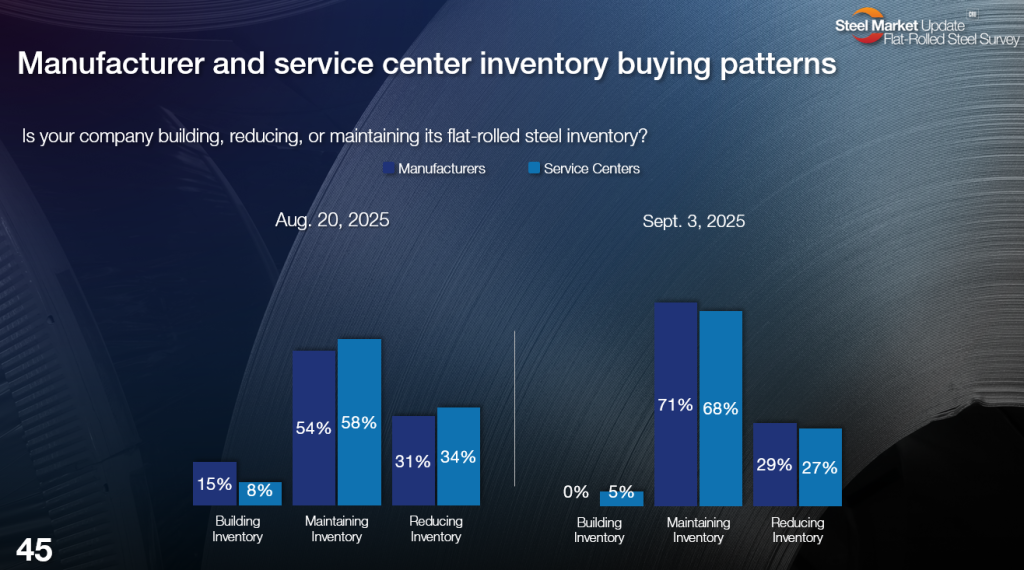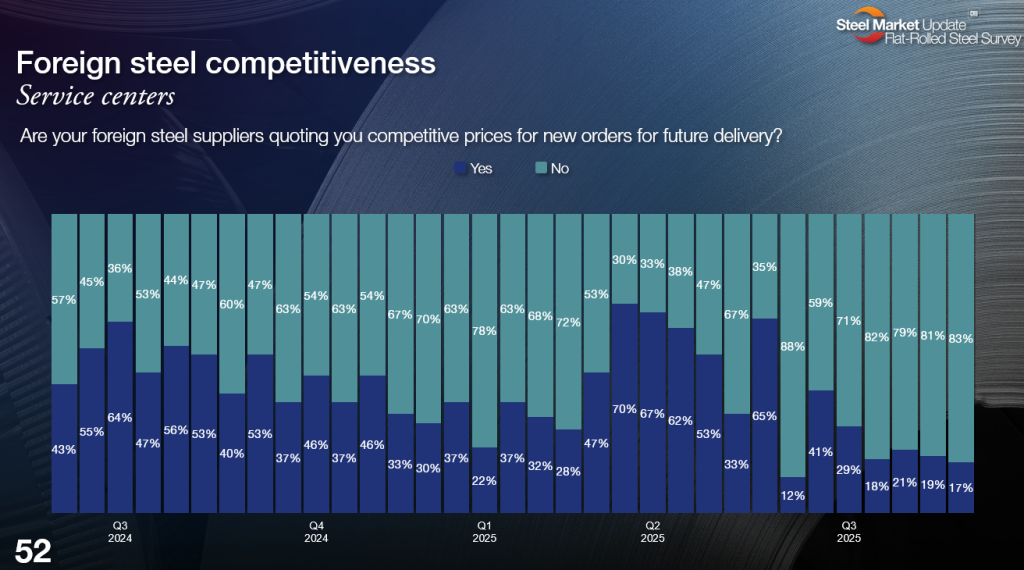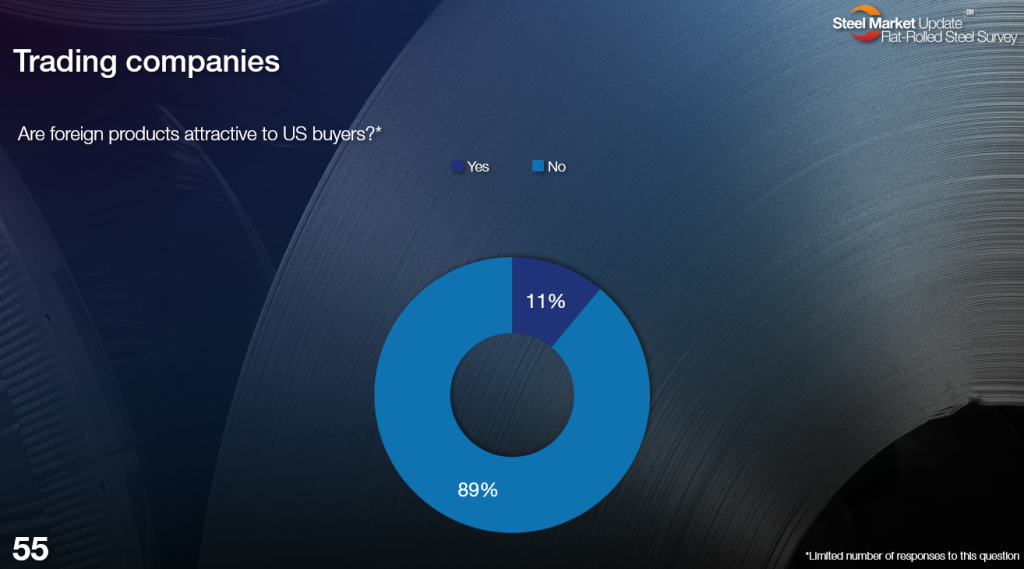Analysis

September 7, 2025
Final Thoughts
Written by Michael Cowden
A recurring theme in conversations with some of you and in the comments submitted to SMU’s surveys is concerns about demand and uncertainty about tariffs.
Some tell me the uncertainty caused by the tariffs is putting a damper on what otherwise might have been a good year for demand. Others say that things should improve later this year and into next as demand improves and as tariff uncertainty wanes.
Such commentary aside, where does SMU’s latest opinion polling on President Trump’s tariffs stand? Let’s take a look at the data. (Note that the page numbers in the slides below refer to pages in our steel-market survey slide deck, which you can find here.)

As you can see, a narrow majority (52%) of steel buyers continue to find that Trump’s tariffs are not helping their business. One-third of respondents (33%) say they’re not sure whether the tariffs are good for business. And only a small minority (15%) said tariffs were helping their business.
The result is broadly consistent with past surveys SMU has conducted. If there is a difference, it’s that some respondents said they were finally starting to see evidence of reshoring.
But enough from me. Here is what respondents had to say, in their own words. By the way, here’s something to know if you’re not familiar with SMU’s surveys. For most questions, we give respondents a multiple-choice answer to select from, and we then provide an optional comment field if they’d like to elaborate on that answer.
Opinions are polarized on the tariff issue. The “yes” camp might have been short on votes, but it made up for that with being more vocal in the comments section. The “I don’t know” folks didn’t have much to say in the comments. And the “no” camp again voiced familiar concerns about uncertainty.
Yes, tariffs are helping my business:
“They have created volatility and introduced a new level of uncertainty that creates opportunity.”
“It’s ever so minimal, but I’m finally seeing at least some reshoring possibly coming to my customer base.”
“Stabilizing domestic prices and keeping low/cheap imports out of our market help us overall. May see lower demand, but the playing field is level now.”
“Onshoring both near term for 2026 and longer term 2027+.”
“We have seen more demand for our products due to fewer imports arriving.”
“They have helped pricing remain stable.”
“Reshoring activities.”
I’m not sure whether tariffs are helping my business:
“Cuts both ways. Short term negative but hoping for long term benefits.”
No, tariffs are not helping my business:
“Killed demand and uncertainty is so high.”
“Costs due to tariffs are affecting the bottom line in most companies.”
“The noise is bad for business, as is the general sense of unknown.”
“Too much chaos.”
“Creating too much uncertainty.”
“Tariffs are terrible.”
“The economy is not strong enough.”
“They are a demand killer. People’s spending power is being impacted.”
“They will drive the economy into recession.”
“No ability to counter the US mills.”
If there is a change to highlight in our latest survey, it’s that most service centers (58%) report they are lowering prices. The balance (42%) said they are keeping prices steady.

Broadly speaking, that’s a trend we haven’t seen since May, before President Trump announced he would double Section 232 tariffs on imported steel to 50%. The difference this time? For a second consecutive survey, no service center respondents (0% for those of you keeping score) said they were raising prices. We haven’t seen a result like that since a steel price swoon a year ago.
Here is what some of those service center respondents had to say:
“It seems as though many service centers are getting very aggressive in their pricing. We just lowered our price by about 2%.”
“We don’t want to keep racing to the bottom on spot market business.”
“The street is very competitive. But we are not chasing orders. Plus, we ran inventory lean during the downward pricing cycle, so we are unable to quote some JIT business.”
“We negotiate when and where needed.”
“We adjust on an order-by-order basis.”
If there is a silver lining to all of this, it’s that most companies met (59%) or exceeded (6%) forecast last month.

Still, a significant minority (35%) said they didn’t meet forecast in August.
Here is what some of them have to say:
“We keep hearing that business conditions are bad yet we continue to have strong months.”
“Coming off a (surprisingly) strong July, we missed forecast in August.”
“Tariffs reduced buys, and sales are down now.”
“Everyone is fighting tooth and nail for the same tonnage.”
Another thing worth noting is inventory management patterns.

We saw some limited restocking over the summer. That’s when certain market participants decided that prices in the $700s per short ton for hot-rolled (HR) coil, for example, wouldn’t be around for long. And some stepped in and made significant purchases.
But we’ve since seen summer pricing linger into the fall along with uncertainty around tariffs. The result of that uncertainty and short lead times: Few buyers see the need to restock.
At the same time, more than 80% of the service centers we survey continue to say that imports are not competitive. And that’s been the case for two months now. (Each bar in the chart below are two weeks apart.)

That tracks with most of the trading companies we survey saying they can’t make attractive offers to US buyers.

Could a combination of lower import levels and lower inventories this fall mean that we’re at or near a bottom for the sheet market? Could it mean we’ll continue to grind lower or bounce around an $800-ish bottom for HR? If I knew the answer to such questions, my friends, I probably wouldn’t be writing this column.
In the meantime, thanks for your continued support of SMU. And if you’re interested in participating in these surveys, drop me a line at michael@steelmarketupdate.com.
We appreciate those of you who already do! It really helps us to keep our finger on the pulse of the market.







